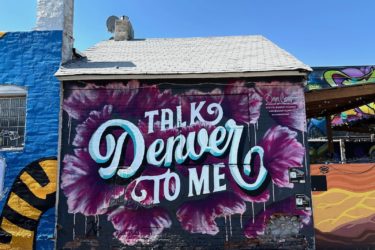The Local newsletter is your free, daily guide to life in Colorado. For locals, by locals.
People are always telling Nadia Bolz-Weber their darkest secrets. That’s probably because the Lutheran pastor advocates for a version of Christianity that finds grace in vulnerability—rather than one that promotes fear of “an angry, capricious God with a killer surveillance system,” she says. After sharing that message as the pastor of North Capitol Hill’s House for All Sinners and Saints church and in three New York Times bestselling books, Bolz-Weber, 51, is doing the same with a podcast, The Confessional. During each episode, she probes guests about their most disgraceful moments to help show how comforting it feels to come clean. 5280 spoke with Bolz-Weber ahead of The Confessional’s April 21 debut about why it’s important to air our wicked deeds, the transition to podcasting, and the toxicity of social media.
5280: There are a lot of interview podcasts nowadays. How is this one different?
Nadia Bolz-Weber: I listen to a lot of podcasts, NPR shows, and interview shows. Those are great. There’s nothing wrong with being dazzled by someone’s accomplishments. But I feel less alone when somebody shares their failings with me, something they have anxiety about, or something they regret. The jagged edges of our humanity are what connect us to each other.
What are some examples of the types of stories you’ll share on The Confessional?
I have—just in this first season—everything from somebody talking about missing the first 13 years of his kid’s life because he was strung out [on drugs] to somebody discussing how they sabotaged a relationship because they couldn’t deal with shame about being gay. I’m interested in how people process these things and how they changed who they are.
Why is it important for people to discuss their worst transgressions?
Secrets can be a huge, hidden, driving force in our lives. If there’s a truth in my life that I’m not willing to admit or voice, it doesn’t go away. It just repackages itself as some other anxiety that wakes me up at 2 a.m. I think there’s so much more freedom in admitting what these things are and exposing them to sunlight. The power that our secrets and shame have in our lives disintegrates when we admit what they are.
It seems like it’s more difficult to be fallible in the age of social media.
I have a friend who’s an Episcopal priest named Jacob Smith, and he says, We’re all three bad days away from being an internet scandal—and most of us are already on day two. If somebody uses the wrong word or you find out they said something two years ago that is today not considered a correct thing to say, you can destroy their career. That part of social media is incredibly toxic to me. I want this podcast to be an antidote to that.
A lot of your previous work has focused on forgiveness. Will that be a major theme?
Yeah, it’s an important part of the show. I did an interview with Megan Phelps-Roper, who grew up in the Westboro Baptist Church. [Editors’ note: Phelps-Roper left Westboro in 2012. She’s been a vocal critic of the church’s extreme practices, such as picketing funerals of U.S. soldiers.] Now, people ask, Are you going to make amends to those whose loved ones’ funerals you were protesting? She said, I’ve never known how to do that, because I don’t want to retraumatize people just so I can feel better about myself. I think she’s so filled with compassion that she struggles with the best way to make amends. I wrote a benediction for her at the end of the podcast, and I do the same for every guest.









